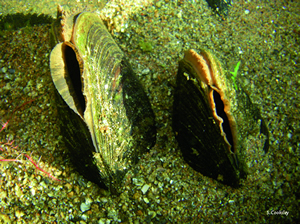 In support of the Water Framework Directive’s requirement for water bodies to meet Good Ecological Status by 2015, we undertake a range of surveys, particularly within streams and the riparian corridor.
In support of the Water Framework Directive’s requirement for water bodies to meet Good Ecological Status by 2015, we undertake a range of surveys, particularly within streams and the riparian corridor.
An area where we have particular expertise is conservation and management of the freshwater pearl mussel (Margaritifera margaritifera L.).
The freshwater pearl mussel is now a rare and critically endangered species, having undergone catastrophic declines throughout its range during the last century due to a range of factors, which include pearl fishing, pollution, hydrological management and the decline of host fish stocks. Surviving populations remain critically vulnerable to these threats and consequently there are a number of international obligations for the protection of the species.
Scotland is a global stronghold for the pearl mussel, holding approximately half of the world’s known remaining viable populations. Only 61 Scottish rivers are known to have viable populations of the freshwater pearl mussel and it has been estimated that if present rates of extinction continues due to a combination of over-fishing, increased siltation, eutrophication and negative impacts on host salmonid populations, then existing populations may only survive for a further 25 years.
Our research in this area focuses on:
- Developing management recommendations for freshwater pearl mussel populations in 18 SACs in Scotland.
- Investigating the impacts of changing flows in the River Dee on freshwater pearl mussels.
- Assessment of the freshwater pearl mussel on the regulated River Kerry SAC in order to inform the management of the hydroelectric scheme.
- Investigating the relationship between geomorphic features and pearl mussel distribution at the macrohabitat scale.
- Survey and monitoring work on mussel populations throughout Scotland.
Who is working in this area?
- Susan Cooksley
- Nikola Freiberg
- Hamish Moir
|
Updated: 23 Jan 2024, Content by: MC
|

